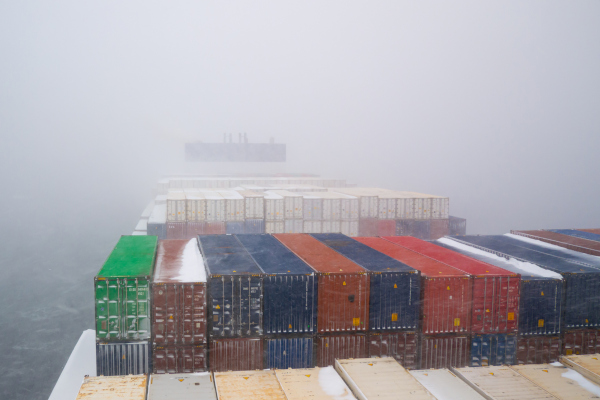Just when you think your supply chain has recovered from the latest disruption, another storm rolls in. Weather-related events are becoming all too common and increasingly disruptive, forcing businesses to rethink their supply chain strategy.
Supply chain disruptions in Latin America, with water levels still at historic lows in the Panama Canal, and the fallout from Hurricane Idalia at the end of August, have shippers on edge as they head into the peak holiday season rush. Many shippers are seeking alternatives to avoid further delays, such as rerouting freight or in some extreme cases paying millions of dollars to jump the line of backlogs at the Panama Canal.
While the impacts of Idalia on supply chains were minimal and the backlog in Latin America has eased some, these events set the stage for better supply chain planning heading into 2024.
“There comes a point where each of these disruptions make for really flexible and fluid supply chains in terms of how they’re able to mitigate risk,” says Matt Muenster, chief economist at Breakthrough, a transportation data analytics firm. “As we move forward, hopefully, each of these events, although they continue to offer challenges, present more opportunities for shippers in their network because they’ve already been here and done that.”
Have a plan in place
According to Mark Russo, chief science officer at Everstream Analytics, companies can prepare in advance of hurricanes or other extreme weather events by already having a disaster preparedness plan in place.
This plan, he says, should include assessments of facility locations, shipping lanes, and planned or in-transit shipments. It should also include an assessment of any supplier locations that will likely be impacted.
“In advance of these events, it is vital for companies to work closely with suppliers to confirm they have their own disaster plan and to have alternative suppliers in the event they go offline for a period of time,” says Russo.
Companies should also be taking steps to increase the resilience of their supply chains to weather-related events, including assessing their vulnerabilities and risks and creating mitigation plans, adds Jena Santoro, senior manager, Intelligence Solutions at Everstream Analytics.
“Establishing temporary warehousing, identifying alternate sourcing methods of critical inputs, components, or ingredients, or even ramping up production at facilities outside of the at-risk area to offset losses during production shutdowns are some tools companies can use to increase resilience,” says Santoro.
Diversify your supplier network
Establishing a diversified transportation network is critical to mitigating the risk of supply chain disruptions. Working with a variety of carriers and fuel suppliers ensures on-time delivery and allows for consistency if a carrier within an affected zone is shut down or offline. Hurricanes and major weather-related events often impact cargo delivery and create supplier production delays.
“Diversification and dispersion of operations is the best mitigation strategy against major weather events, whether that be permanently integrated in companies’ supply chains or involved in a temporary disaster management plan,” says Santoro.
Creating a more resilient supply chain
A resilient, flexible or agile supply chain should be top of mind for every business going into 2024. Supply chain resiliency not only allows you to quickly respond to weather-related events, but it ensures you are prepared and able to adapt to whatever may come. The key to creating this resiliency is by planning ahead and mitigating foreseen risks.
“What shippers can do is make that list of risks to their network in 2024 and beyond,” says Muenster. “I think what events like these have also shown is that the sensitivity of supply chains to climate risks continues to grow; the probability of those risks continues to grow. It’s not the first time this has happened to the Panama Canal.”
Beyond forecasting potential risks and developing strategies for mitigating them, companies should look to data analytics and advanced technologies to help monitor and manage risks. Technology is also making way for end-to-end visibility with real-time alerts when disruptions occur.
“It’s hard to stay positive…shippers are just kind of tired of disruption. But hopefully, they’re receiving some of the benefits of building and adapting a flexible supply chain and risk mitigation strategy over the last couple of years,” concludes Muenster.
SC
MR


Latest Supply Chain News
- Planning fatigue may be settling in
- Inflation, economic worries among top supply chain concerns for SMBs
- April Services PMI declines following 15 months of growth, reports ISM
- Attacking stubborn COGS inflation with Digital Design-and-Source-to-Value
- Despite American political environment, global geopolitical risks may be easing
- More News
Latest Podcast

 Explore
Explore
Business Management News
- Planning fatigue may be settling in
- Inflation, economic worries among top supply chain concerns for SMBs
- April Services PMI declines following 15 months of growth, reports ISM
- Attacking stubborn COGS inflation with Digital Design-and-Source-to-Value
- Joseph Esteves named CEO of SGS Maine Pointe
- Employees, employers hold divergent views on upskilling the workforce
- More Business Management
Latest Business Management Resources

Subscribe

Supply Chain Management Review delivers the best industry content.

Editors’ Picks




